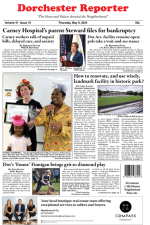August 30, 2023
In the coming weeks, voters will get a chance to make their choices in the first round of balloting for the open seat for the City Council’s District 3 as seven candidates vie to replace Frank Baker. The longtime councillor, first elected in 2011, isn’t running for another two-year term on the 13-member body.
Open seats don’t come along often: Before Baker, Maureen Feeney served as the District 3 councillor for 17 years. The preliminary is set for Sept. 12, and two finalists will face off on Nov. 7.
With that in mind, and as in past election cycles, the Reporter sent out a questionnaire to all seven candidates, asking for their thoughts on a variety of topics, ranging from whom they view as their role models, to their top priority, and which specific agency they feel needs urgent reform.
The responses of six out of the seven, available in full below, varied. Housing activist Rosalind Wornum did not respond.
John FitzGerald | Questionnaire Responses
Jennifer Johnson | Questionnaire Responses
Barry Lawton | Questionnaire Responses
Matt Patton | Questionnaire Responses
Joel Richards | Questionnaire Responses
Ann M. Walsh | Questionnaire Responses
On the topic of gun violence, John FitzGerald, a Boston Planning and Development Agency official, said there are “too many guns” on the streets, and police must work to crack down on illegal firearms.
“At the same time, we need to be partnering with community organizations that will help get to the root cause of the violence. Both are necessary if we ever want to see lasting progress made here,” he wrote.
Jennifer Johnson, a Meetinghouse Hill activist, said that by the time a young person has picked up a gun, “we have failed as a city, because that young person has lost hope.” Public schools must “show our kids their opportunities based on their own skills, interests and talents,” she said in her response.
Matt Patton, a Savin Hill labor lawyer, called gun violence “far too common.” As a parent of two children, “I am constantly looking for what exit I would use or how I would get my kids to safety when I bring them to the grocery store, restaurants, movies, parks, or any public place,” he wrote. State and federal officials must step in with stronger gun laws, and there should be greater investment in after-school activities, job training, as well as school counselors,” he wrote.
Joel Richards, who lives in Fields Corner and teaches in the South End, said he has personally witnessed and felt the impact of gun violence. He said more money must be spent on professionals to meet “youth where they are at,” and “redirect them now before they do something they cannot undo.”
Barry Lawton, a former schoolteacher who lives in the Uphams Corner/Savin Hill area, said he would “emphatically inform those who treat our streets like the ‘Wild West’ that they will find no quarter.” He added: “The long list of unsolved murders is intolerable and needs extraordinary attention. I will work with law enforcement on all fronts to give them the resources to do their job.”
Ann M. Walsh, a Lower Mills resident who recently led an education nonprofit, said that “while community policing and law enforcement are important pieces of the puzzle, crime reduction and public safety are not just the purview of the police.” Providing jobs is key, she added. “I will focus on pathways to jobs for all, including for people with [criminal records], and the expansion of enrichment programs for youth to build stronger relationships in our neighborhoods.”
The candidates also offered a wide-ranging list of role models. Walsh’s three were the a late diplomat Madeleine Albright,” who learned from her own experience as a refugee and spent her entire career speaking up for justice and human rights”; Dolores Huerta, co-founder of the National Farmworkers Association who led a movement for better pay and workplace safety; and American revolutionary Samuel Adams.
Richards listed his fellow educators and longtime Dorchester residents Roger and Claire Dewey, as well as Shirley Chisholm, the first Black woman elected to Congress, and the late Mel King, a South End community organizer who ran for mayor. “His leadership in Boston has greatly influenced my work as a teacher, specifically that to truly uplift and educate our youth it takes organizing the community around them and collaborating with their family,” Richards wrote.
Patton listed four people whom he previously worked for, including Gov. Deval Patrick and Lt. Gov. Tim Murray, and Eunice Kennedy Shriver, who he worked with through the Special Olympics. John Barros, a former economic development chief and mayoral candidate, was the fourth. “Working for John, I learned the importance of uniting people and communities to advance common values – even if there are seemingly divergent interests,” Patton wrote. “John showed that it’s possible to lift up communities by creating broad-based coalitions.”
Johnson, who grew up in Louisiana, pointed to the three Kennedy brothers: “Jack, Bobby, and Teddy. President Kennedy and Attorney General Kennedy substantially changed my life by using their power to desegregate schools in the South,” she wrote. “I was the first person in my family to go to desegregated schools and having friends and classmates who were not white changed the course of my life.”
Lawton also listed President Kennedy, as well as the late state Rep. Doris Bunte and former state Sen. Richard Moore and his wife Joanne.
FitzGerald said his was an easy pick: His father, the late Mission Hill and Jamaica Plain state Rep. Kevin Fitzgerald. “He did an amazing job as an elected official, and that only pales in comparison to the job he did as my Dad. I miss him every day and hope I can make him proud.”



